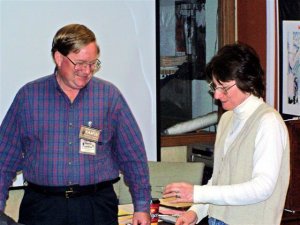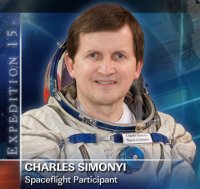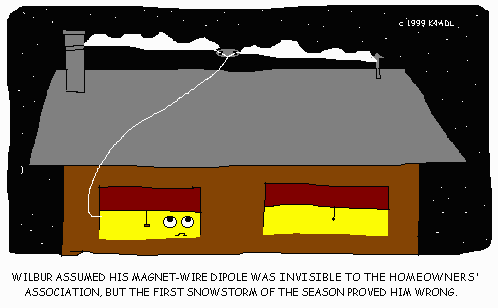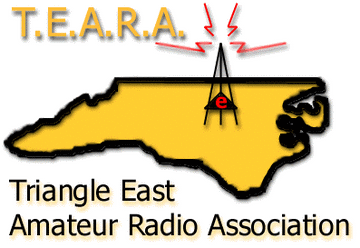"Relax, I'm Here!"

KF4TFM Is Finally Official
It's official! After over seven years as a member of the TEARA VE Team, Carolyn
Armstrong, KF4TFM, is now a bona fide member, and she has the badge to prove it. Carolyn (finally) received her badge at the March 17, 2007 VE session. So what's the big deal about a badge?Well,
Carolyn and her husband Brian, KF4TFL, have been members of
the TEARA VE Team since both received their extra class licenses
- Brian as a VE and Carolyn as our
official record-keeper. As long as you use good barbeque as bait, competent VE's are fairly easy to come by,
but good paperwork people are a scarce commodity. So
while we really like having
Brian around, in part it is because he brings Carolyn. If they
are cutting it close on arriving, near panic sets in as we try to
figure out who's gonna do the paperwork. Besides, as a VE Brian
has been badged from the beginning. However, early on, Carolyn
felt that her nitch was keeping the records in order, so she decided
she would rather do that than be a VE. And what a job she has done! Thanks
to her
attention to detail, we have not had a single error in any session
submission since she has been on the job. Unfortunately, since she
was not an "official" VE, she was not eligible for an "official" VE
badge. Still, something needed to be done! So
it was with great pleasure that the team presented Carolyn with her
very own badge on March 17, showing her status as a TEARA VE Team
member. But her badge has a little something extra. It is
imprinted with the phrase that sums up the feeling of this team every
time we see her... "Relax, I'm Here!" Congrats, Carolyn! The Sky That Did Not Fall
Norman Young
KA4PUV
Everybody
knows the story of Chicken Little. He's the little rooster wanabe who
gets conked in the head by a chunk of a falling sign that just happens
to have a picture of a star on it. When Chicken Little sees this star,
he becomes convinced that the sky is falling and everyone in the
chicken coop is doomed.
But in that story, the sky never does fall.
From the very beginning of phone operations on the ham bands,
there were those who wanted to eliminate code as a requirement for an
amateur radio license. And no sooner than the first proposal to
eliminate code was floated, the vast majority of hams predicted that if the code requirement was eliminated, it
would be the end of amateur radio. Like Chicken Little,
they predicted that the day code was no longer required, the sky would fall.
Although initially few in number, the "no-code"
advocates were nothing if not persistent, and as we all know by
now, they finally got their way. It took them nearly a hundred years to
do it, but effective February 23 of this year, Morse code proficiency was no
longer a requirement for any amateur license.
And the sky did not fall.
Now let me be clear. I was one of those opposed the elimination of code. I got
my extra ticket the old fashioned way by slogging my way up to the
required 20 words per minute. It took me weeks of practice, but I
finally passed that test, and those present when I did will
confirm that I kissed that CSCE repeatedly. I saw then, and
still see, much value in Morse code proficiency, both for emergency
communications and amateur radio heritage. So
when the FCC issued its Notice of Proposed Rulemaking seeking comments
on the elimination of the code requirement, I submitted a rather
lenghty comment on the matter. (If you are curious, you can
view it HERE.)
Like hundreds of other commenters, I hoped that the FCC
would provide enough good reasons to retain the code
requirement to turn back the tide..
Still, I recognized that there were lots of bright and talented people
with highly specialized technical backgrounds who wanted to do ham
radio, but who had no interest in either learning or using Morse code.
I also saw lots of "No code"
techs out there who did some pretty amazing things using only their VHF
privileges, including pushing the edge of the envelope on VHF DX,
emergency communications, cutting edge high altitude rocketry and
balloon telemetry, and much much more. So while I was
disappointed that I did not get my way on the code, I had every
reason to believe that the sky would not fall when these same people
upgraded and hit the HF bands - with or without code.
This belief was confirmed for me by the recent RARS hamfest. I saw
something there that I had not seen in several years - a crowd! I
don't have any idea what the final numbers were, but I know the
building was full, and it was hard to get around to all the tables for
the sheer number of people present. This was a far cry from the last
few years when attendance was trending downward.
Many of the hams in attendance were codeless upgrades, bringing an
enthusiasm to ham radio that I have not seen in some time.
I overhead many questions being asked by these newbies regarding
installation and setup of their new HF stations. Thankfully, I
also heard a lot of solid answers coming from "Elmers," many of
them who had probably also opposed to the elimination of code.
So has "no-code" changed amateur radio?
Probably, but not as much as expected. The SSB portions
of the HF bands are a little noisier (not necessarily a bad thing),
and the code portions are as active as ever. As a result, we may be hearing a
few more beginner mistakes as the new generals take to the airwaves, but
newbies tend to learn much more quickly than those who think they
already know it all.
Code is gone, but so far. the sky is not falling, and I really think we're gonna be OK. Next Civilian Space Traveler Is Amateur Radio-Ready
From the March 9, 2007 ARRL Letter
The next civilian space traveler is Amateur Radio ready. Amateur Radio on the International Space Station (ARISS) <http://www.rac.ca/ar iss>
reports that software pioneer and aviator Charles Simonyi, KE7KDP,
plans to talk with students at three schools during his stay in space.
He also may make casual contacts. Simonyi, 58, is set to head into
space April 7 on a Soyuz "taxi mission" to the ISS. He'll accompany
Expedition 15 Russian cosmonauts Fyodor Yurchikhin, RN3FI, and Oleg
Kotov. They'll join US astronaut Sunita Williams, KD5PLB. As a client
of Vienna, Virginia-based Space Adventures Ltd <http://www.spaceadventures.com>,
Simonyi will pay $25 million for the privilege. He's been undergoing
pre-flight training at Star City, Russia. During his eight-day
stay aboard the ISS, he will conduct experiments on behalf of several
international space agencies. iss>
reports that software pioneer and aviator Charles Simonyi, KE7KDP,
plans to talk with students at three schools during his stay in space.
He also may make casual contacts. Simonyi, 58, is set to head into
space April 7 on a Soyuz "taxi mission" to the ISS. He'll accompany
Expedition 15 Russian cosmonauts Fyodor Yurchikhin, RN3FI, and Oleg
Kotov. They'll join US astronaut Sunita Williams, KD5PLB. As a client
of Vienna, Virginia-based Space Adventures Ltd <http://www.spaceadventures.com>,
Simonyi will pay $25 million for the privilege. He's been undergoing
pre-flight training at Star City, Russia. During his eight-day
stay aboard the ISS, he will conduct experiments on behalf of several
international space agencies.
"I am fascinated by the
technologies utilized by the American and Russian space programs,"
Simonyi said. "As an engineer, I look forward to studying the different
engineering approaches." Simonyi obtained his Technician ticket in
December.
Space Adventures says Simonyi's mission goals are to
advance civilian space travel, assist with space station research and
involve youth in the science of space travel. He established his space
flight Web site <http://www.charlesinspace.com/> to chronicle his training experiences.
A
native of Hungary, Simonyi earned a bachelor's degree in engineering
and mathematics from the University of California at Berkeley and a
doctorate in computer science from Stanford University. Over the years,
he's been associated with Xerox and with Microsoft, where he oversaw
the teams that developed the company's Excel, Multiplan, Word and other
applications.
After leaving Microsoft in 2002, Simonyi founded
Intentional Software Corporation, a software engineering company. The
following year, he founded
the Charles Simonyi Fund for Arts and Sciences to support arts organizations, science programs and educational institutions.
Simonyi
began his cosmonaut training in September. As part of his multi-faceted
training at Star City, he has learned how to use the ARISS gear aboard
the ISS.
Space Adventures organized the flights for the world's
first private space explorers, Dennis Tito, KG6FZX, Mark Shuttleworth,
Greg Olsen, KC2ONX, and Anousheh Ansari. "We wish Charles well and we
look forward with great anticipation to his launch," said Space
Adventures President and CEO Eric Anderson.
Shelby Hendren
NC4SH
TEARA meeting 03-27-07
The
meeting was called to order at 18:55 by Sherry, KB4EXL. The
treasurer’s report was given by Lynwood, AF4XJ. The minutes for
February were read by Shelby, NC4SH and approved as amended.
Sherry
announced that Sam, NC4SJ will no longer be able to lobby the
legislature, he is also stepping down as our registered agent, and
Norman, KA4PUV will pick this up. There is a local
bill (SB404) in process for New Hanover County that will allow hams to
put up antennas where local covenants now ban them. Frank also
announced that Tim Slay, N4IB is looking for someone to be a liaison
to the state legislature. Holt brought up the nets, 2 & 6 meters,
he encouraged all to check into both nets. Sherry read an email
from Norman, KA4PUV reminding us about the upcoming Field Day on June
23rd & 24th. Lynwood, AF4XJ commented that last years
location was perfect and that we should use it again. Ronnie,
WA4MJF made a motion that the club should authorize Lynwood to pay for
[a club expense]. It was seconded by Frank, W4FAL and
approved by voice vote.
The program this month was the use of a Logikey keyer, it was given by Frank, W4FAL.
The meeting was adjourned at 20:00.
Members Present:
Lynwood
Hobbs, AF4XJ; Sherry Reams, KB4EXL; Ronnie Reams,
WA4MJF; Hal Spencer, K4NKR; Shelby Hendren, NC4SH; Libby
Pierpoint, KI4JWZ; Robert Pierpoint, KG4BDX; Frank
Lynch, W4FAL; Linda Bloodworth; Ruth
Bloodworth, KE4DRI; Max Bloodworth, KO4TV; Jimmie
Wooton, K4CMH; Holt Thornton, AC4UD.
Next Meeting - April 24, 2007
The
Triangle East Amateur Radio Association meets the fourth Tuesday of
each month, at 7:00 pm, in the fellowship hall of the Wendell United
Methodist church. Although the official meeting begins at 7:00
pm, members and guests usually arrive around 6:00 to 6:30 with their
favorite fast food or brown bag meal. TEARA meetings feature an
excellent variety of programs of interest to hams. Please
give the club a visit and consider becoming a member. (TEARA does
not hold a regular meeting in December, but instead usually holds a
Christmas party some time during the month at a member's home.).
The TEARA 2 meter net meets every Tuesday evening at 8:30 PM (local) on
uses the WB4IUY repeater (147.390+, PL 88.5), located near
Clayton, NC. TEARA also holds a 6 meter net on Thursday nights on the
K4ITL repeater (53.030 -) which is located near Lake Wheeler.
All amateurs within range of either of these fine repeaters are
encouraged to drop by to check in and stand by for some serious rag
chewing!
Next VE Session - April 21, 2007
TEARA's Volunteer
Examiner Team holds a VE session on the third Saturday of each month
except July and December at the Red Cross building in downtown
Smithfield. For details, please visit the team's website located here, and be sure to visit us in person when you are ready for that first license or upgrade!
K4ADL Cartoon

Credit Where Credit Is Due
Cartoon courtesy of K4ADL ( www.qsl.net/k4adl).
KF4TFM photo courtesy Tom Lewis, W4SIS. Charles Simonyi photo courtesy NASA.
ARRL Newsletter articles reprinted by permission of the American Radio Relay League. And a special thanks to KB4EXL for proofreading this issue!
|

 iss
iss